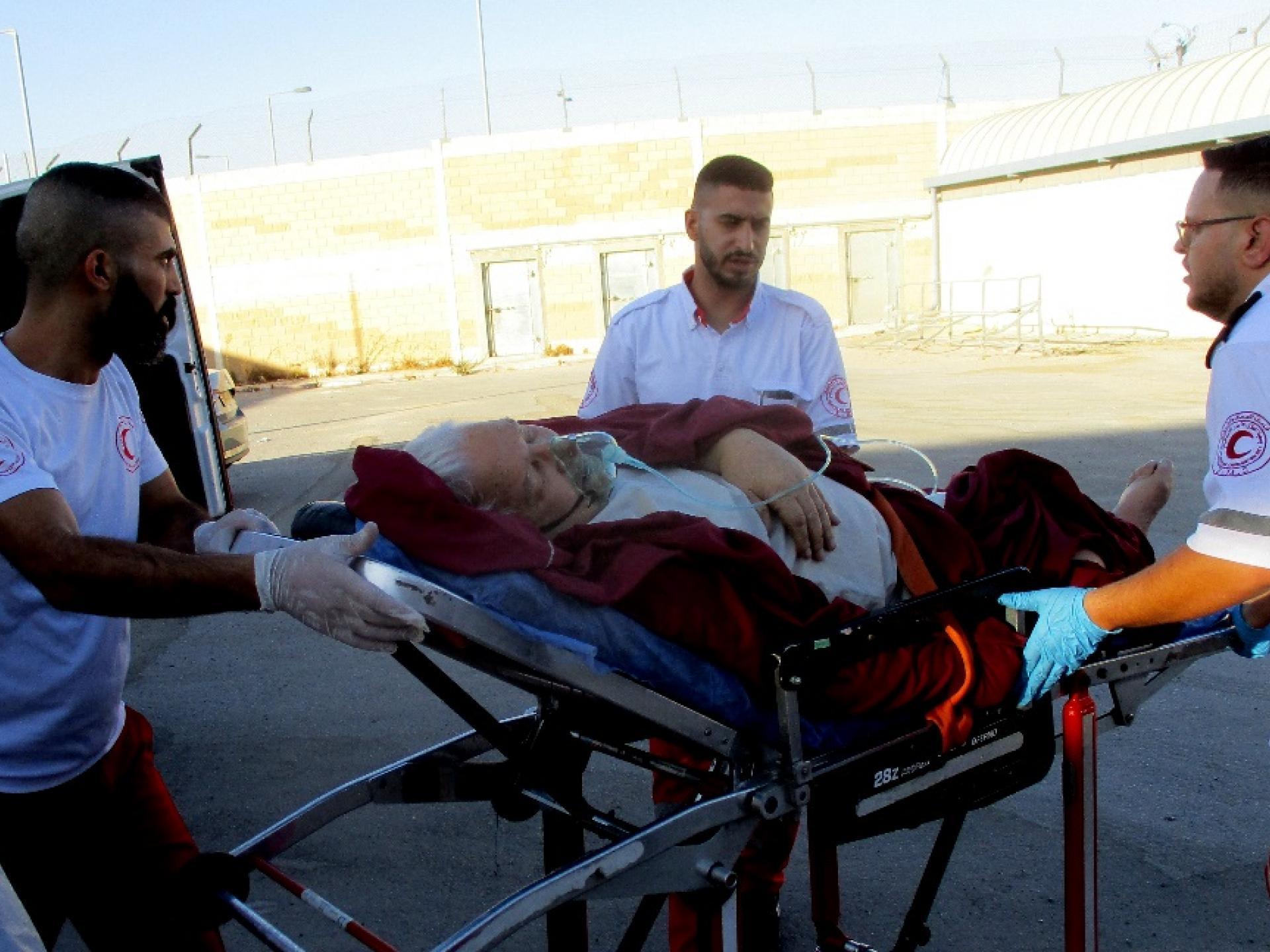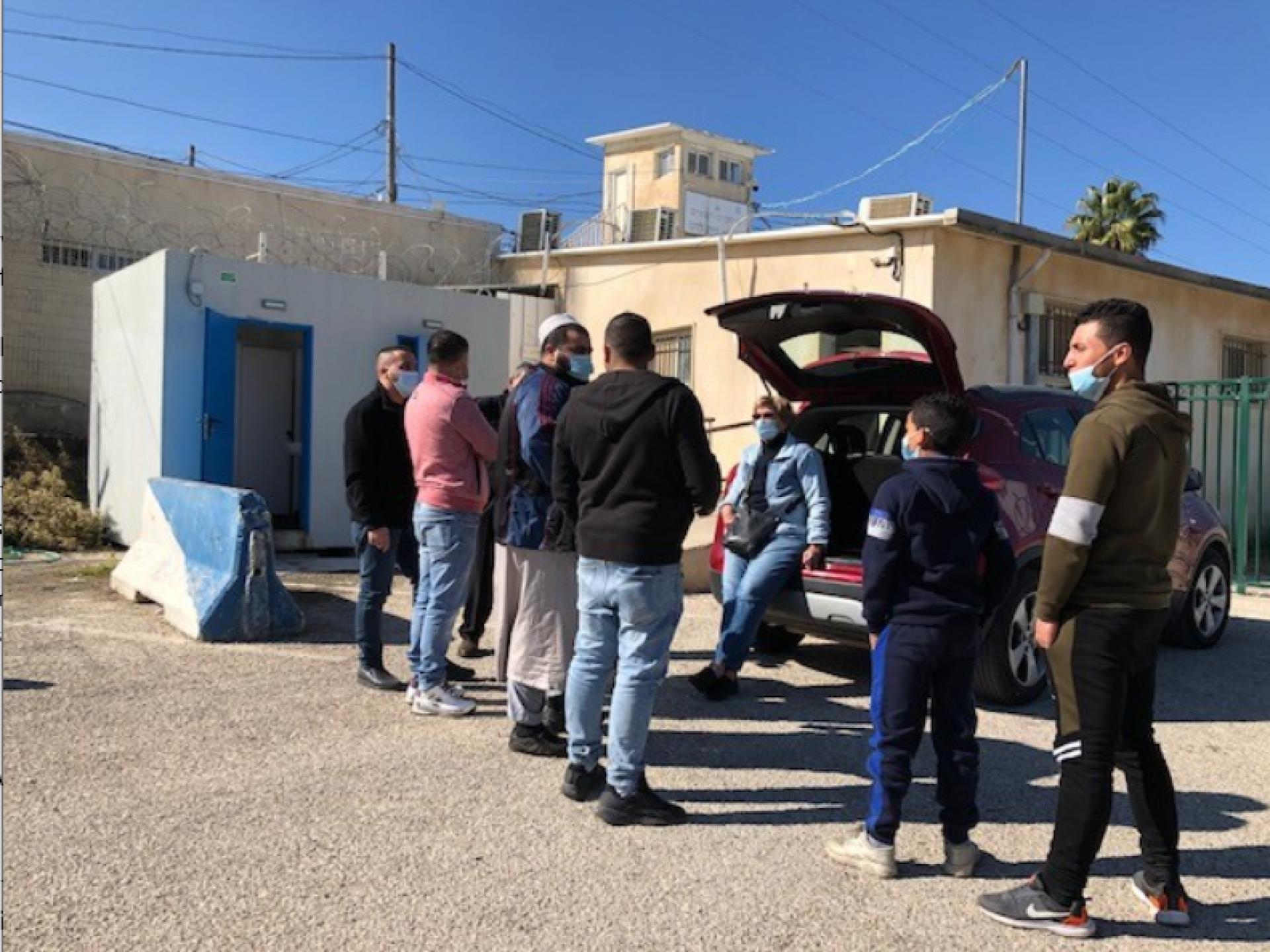
- “Even before the patient lying in the ambulance met a human eye, guns and procedures, the Red Crescent paramedic cried out to the soldiers: “His condition is deteriorating!”, and yelled the same again, trying to hurry them up, so that they quickly approve his crossing and begin the procedure of passing him on to the right ambulance.All in vain.They continued, business as usual, with their usual work order – making sure the patient was really the patient, that his accompanying wife and son really are who they say they are, and that no fault be found with the transit permits. The soldiers photographed everyone’s IDs, all unhurriedly and by the book.” As I was told in the past about a 73-year-old cardiac patient who arrived at the checkpoint unconscious: “Does he really think he could just come here, cross and be hospitalized??
MachsomWatch member continued waiting with the critical heart patient in Qalandia until he was on his way to the hospital in Israel:“
…A young girl-soldier who noticed my concern for the man detained in the ambulance who was on the verge of dying, tried to defend this delay by claiming that “We allow them to cross the checkpoint and get to the hospital” as if it were a generous gesture on their part, to pass the dying through… I answered that health care is a right, not a privilege. What you do is to tighten the stranglehold over millions of people. Notification arrived that the paperwork was in order and back-to-back ambulance transfer could begin. Only when the ambulance doors were closed and the vehicle got on its way, the Red Crescent team and I with them breathed, relieved.”
Qalandiya Checkpoint, October 2022
Most Israelis cannot begin to imagine the great struggles facing Palestinians trying to get vital medical care in Israel. When it comes to coordination with patients, who are at times moribund, one cannot abide “by the book”. Such a powerful position requires being able to understand and identify with the Palestinian population. The personality of the Israeli coordinator (on behalf of the Civil Administration
) and his worldview are a mandatory step towards fulfilling Israel’s duty to provide Palestinians with basic human rights. Now, with the Civil Administration falling into the hands of extreme-right ministers, who possess a minimal empathy towards Palestinians, this situation is very likely to worsen.
We encounter many health permit problems in our weekly shifts in the DCO in Etzion and through our human rights aid hotline, we present two recent below:
- The saddest and most difficult case we met today was of a young couple in their twenties, who have a 5-years-old child with all the disabilities imaginable. He is disabled both mentally and physically, suffering from a rare genetic syndrome. The child was at Hadassah Hospital in Jerusalem yesterday and is treated with oxygen. He must be under constant supervision and when the oxygen begins to run out, he must be returned to hospital.
They live in the Occupied Territories and are GSS blacklisted. Indeed, we are not obliged to believe them when they claim they don’t know why. One of them may have done something, or perhaps it was a member of their extended family whom they don’t even know. One cannot find out the reason for their blacklisting status because the Israeli General Security Services do not explain. An appeal normally takes many months.
In order to get their entry into Israel approved, the DCO officer requires the hospital to note the exact date of hospitalization, and we ask: How could the family know when oxygen begins to run out? Is there no one in this bureaucratic system able – like us – to read the document they hold in which the hospital requires the authorities to let the father enter Israel immediately when needed? That his is an emergency case? Is there a reason that our calls go unanswered?
The woman said, “The soldiers are on their lunch break”. Seeing the young couple anxious and helpless made us feel useless, aching and angry. We passed this matter to Hannah B., member of our team who helps with humanitarian problems at MW, so that she could look into it. It took Hannah a few days to obtain an entry permit for the family – a 24-hour permit valid for 3 months.
Etzyon DCO, February 2022

- An urgent phone call came into the MW hotline. On the line was a young man from Awarta village, near Nablus, suffering from bone cancer. The disease began in his ankle and spread to the whole leg.
His particular type of cancer is treated by one specialist who receives patients in the Tel Aviv area. Because of this patient’s life-threatening condition, the specialist invited him for an evaluation about further treatment. But – the patient is GSS blacklisted, and was refused entry into Israel. No reason for his blacklisting is given.Finding out why and removing the blacklisting status take months. In spite of our efforts, this young man will not make it to see the specialist. We had to pass on the bad news to the patient. He invited us to the mourning tent that will be erected in his memory – his version of black humor…
Jerusalem, November 23, 2022
- International law requires the occupying sovereign to care for welfare of the occupied population. Freedom of movement and free access to vital medical care are basic building blocks of human rights. However, the Israeli occupation sees a big difference between the human rights of Israelis and those of the occupied subjects that need to be controlled in any way possible.
- Israel never acknowledged itself as an occupier, however it took upon itself partly the humanitarian decrees as outlined in the Geneva Convention. But it has never seen Palestinian health as a basic right, and therefore does as little as possible to provide it.
- In fact, health has turned into another tool serving Israel’s control of the Palestinian population. Health services and conditions that enable access to it have been developed by the “carrot and the stick” method. Israel has indeed invested to a certain degree in public health in the Occupied Territories, mainly because it sees this as serving an Israeli interest - “the virus does not stop at the checkpoint”.
On the other hand, Israel prevents the training of physicians and investment in their specialization, and even limits the introduction of new equipment, wishing to exploit for its own interests the Palestinians’ dependence upon Israeli health systems. Let us also not forget that the Israeli government profits economically from every patient for whose treatment the Palestinian Authority pays.
- The lack of transparency, arbitrariness and absence of clear rules establishing who gets what and when – have all become more severe as the complicated system of checkpoints and movement restrictions developed. Such a system greatly impacts those in need of medical treatments that are unavailable in the West Bank and has yielded a long and exhausting bureaucracy of permits. These are issued at the time and at a pace determined by the Civil Administration
 and the GSS. There is no proper answer for emergency situations that require solutions “outside the box”, and even less openness for the planning of medical treatments, even when every postponement means a threat to the patient’s life.
and the GSS. There is no proper answer for emergency situations that require solutions “outside the box”, and even less openness for the planning of medical treatments, even when every postponement means a threat to the patient’s life.

The decision of the upcoming rightist government to pass the control of the Civil Administration
to Smotrich will enable him to make political appointments and determine who will be in charge of every aspect of the Occupied Territories’ and its Palestinian residents. The newly elected have declared that the coming “full rightist” government will completely do away with existing brakes on the means of control of the territories.
Since the Israeli economy depends on Palestinian workers, this field might see less changes. However, humanitarian issues that are already considered by the authorities not as a duty but rather as acts of “good will” might be harshly impacted. Such issues are already characterized by the lack of willingess to help. In the hands of those wholeheartedly in favor of expelling Palestinians from the Occupied Territories, the situation might become catastrophic.
